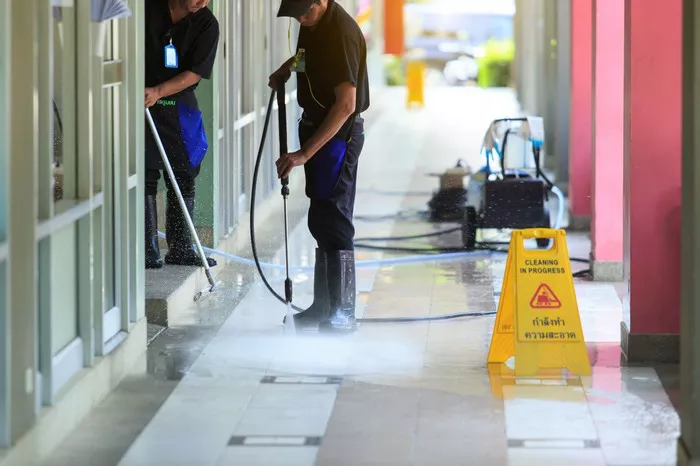Power washers, also known as pressure washers, are invaluable tools in the realm of cleaning technology. These robust machines utilize high-pressure water jets to blast away dirt, grime, and stains from various surfaces. Whether you’re tackling a driveway, patio, siding, or even a vehicle, a power washer can make quick work of tough cleaning tasks.
A common question that arises when considering the use of power washers is, “Do power washers use a lot of water?” In this comprehensive guide, we’ll delve into the specifics of water usage with power washers, examining factors that influence consumption, exploring efficiency and conservation measures, presenting practical examples, and comparing their water usage to alternative cleaning methods.
Explanation of Water Usage:
Overview of Water Consumption:
Power washers are known for their ability to deliver high-pressure water streams, which might lead one to assume they consume large quantities of water. However, the actual water usage varies depending on several factors.
Influencing Factors:
1. Pressure Setting: Higher pressure settings typically result in greater water consumption. Adjusting the pressure to match the cleaning task at hand can help optimize water usage.
2. Nozzle Type: Different nozzle types produce varying spray patterns and pressures, influencing water consumption accordingly.
3. Surface Size: The area being cleaned directly impacts water usage. Larger surfaces require more water to ensure thorough cleaning.
Comparison with Traditional Methods:
When compared to traditional cleaning methods like using a garden hose or manual scrubbing, power washers can actually be more water-efficient. While power washers use higher pressure, they also require less time and water to achieve comparable results, especially when dealing with stubborn stains or large surface areas.
Efficiency and Conservation:
Importance of Water Conservation:
In today’s world, where water scarcity is a growing concern, it’s essential to prioritize water conservation in all aspects of life, including cleaning tasks. Power washer manufacturers and users alike recognize this imperative and have been actively working towards more efficient water usage.
Technological Advancements:
Recent advancements in power washer technology have focused on enhancing cleaning effectiveness while minimizing water consumption. Features such as adjustable pressure settings, specialized nozzles, and efficient detergent usage play crucial roles in achieving this balance.
Tips for Maximizing Efficiency:
1. Adjust Pressure Settings: Use the minimum pressure necessary to get the job done effectively.
2. Choose the Right Nozzle: Select a nozzle that matches the cleaning task to avoid unnecessary water wastage.
3. Use Detergents Wisely: Utilize eco-friendly detergents designed for use with power washers to enhance cleaning effectiveness without excessive water usage.
Practical Examples and Case Studies:
Real-World Scenarios:
To illustrate the impact of power washer usage on water consumption, let’s consider a few real-world examples:
1. Driveway Cleaning: Before using a power washer, a homeowner typically used a garden hose and scrub brush, consuming approximately 100 gallons of water. With a power washer, the same task required only 20 gallons, resulting in significant water savings.
2. Commercial Building Maintenance: A facility manager switched from manual cleaning methods to power washing for exterior maintenance. This transition led to a 40% reduction in water usage while achieving superior cleanliness.
Comparison with Alternative Cleaning Methods:
Water Usage Analysis:
When compared to alternative cleaning methods such as manual scrubbing or chemical cleaners, power washers emerge as clear winners in terms of water efficiency. While initial water consumption might appear higher due to the high-pressure jets, the overall water savings and efficiency gains justify their usage.
Potential Water Savings:
By utilizing a power washer instead of traditional methods, users can expect to save significant amounts of water, especially when dealing with large surface areas or tough stains. The upfront investment in a power washer often pays off in long-term water conservation and cost savings.
Conclusion:
In conclusion, while power washers utilize high-pressure water jets, they are surprisingly efficient in terms of water usage when compared to traditional cleaning methods. With advancements in technology and a growing emphasis on water conservation, power washers offer an environmentally friendly solution for tackling tough cleaning tasks. By following best practices and utilizing modern features, users can maximize cleaning effectiveness while minimizing water consumption. So, if you’re considering investing in a power washer, rest assured that you’re not only getting a powerful cleaning tool but also contributing to water conservation efforts.
Whether you’re a homeowner, facility manager, or professional cleaner, embracing power washer technology can lead to cleaner surfaces, lower water bills, and a greener planet. Make the switch today and experience the difference for yourself!

